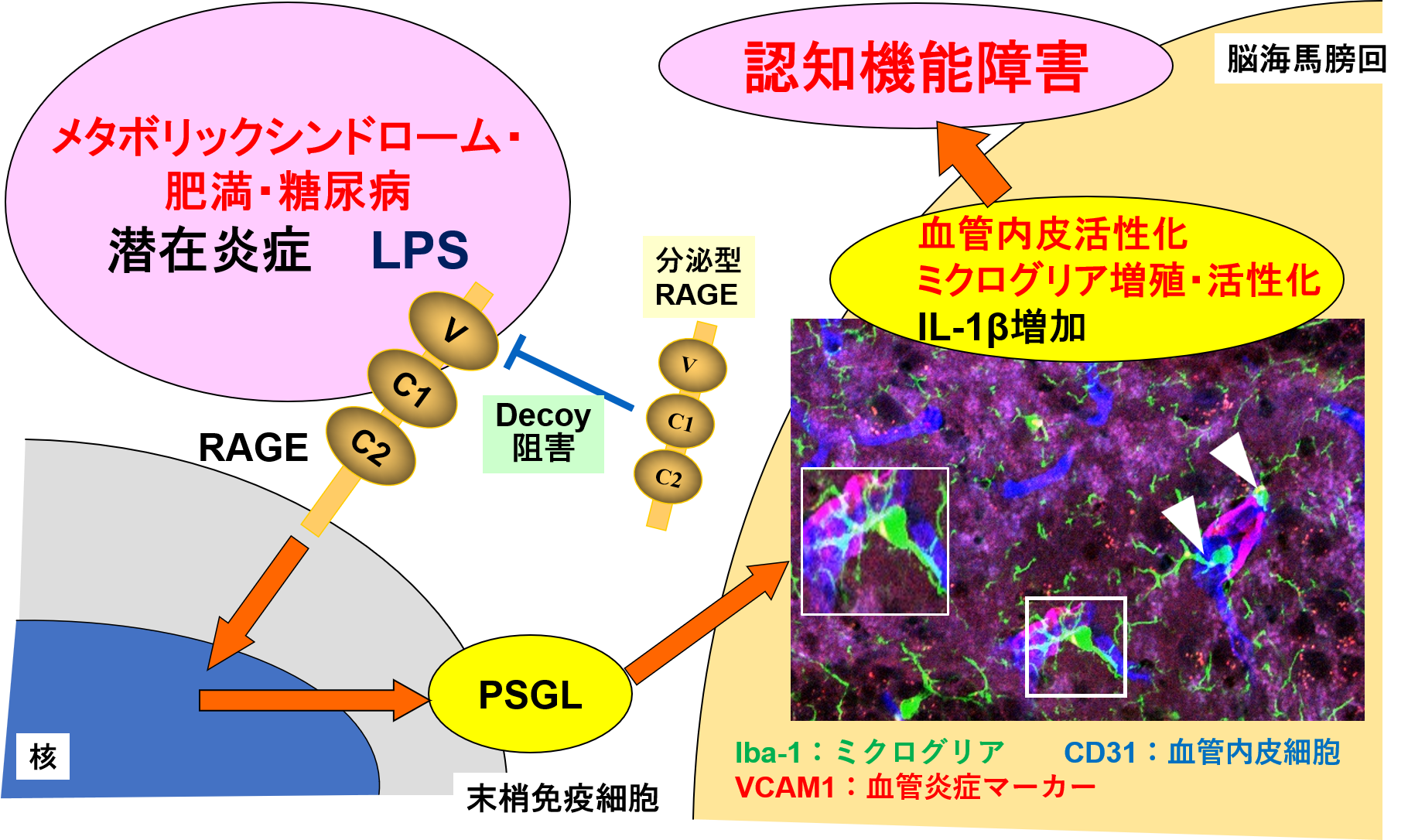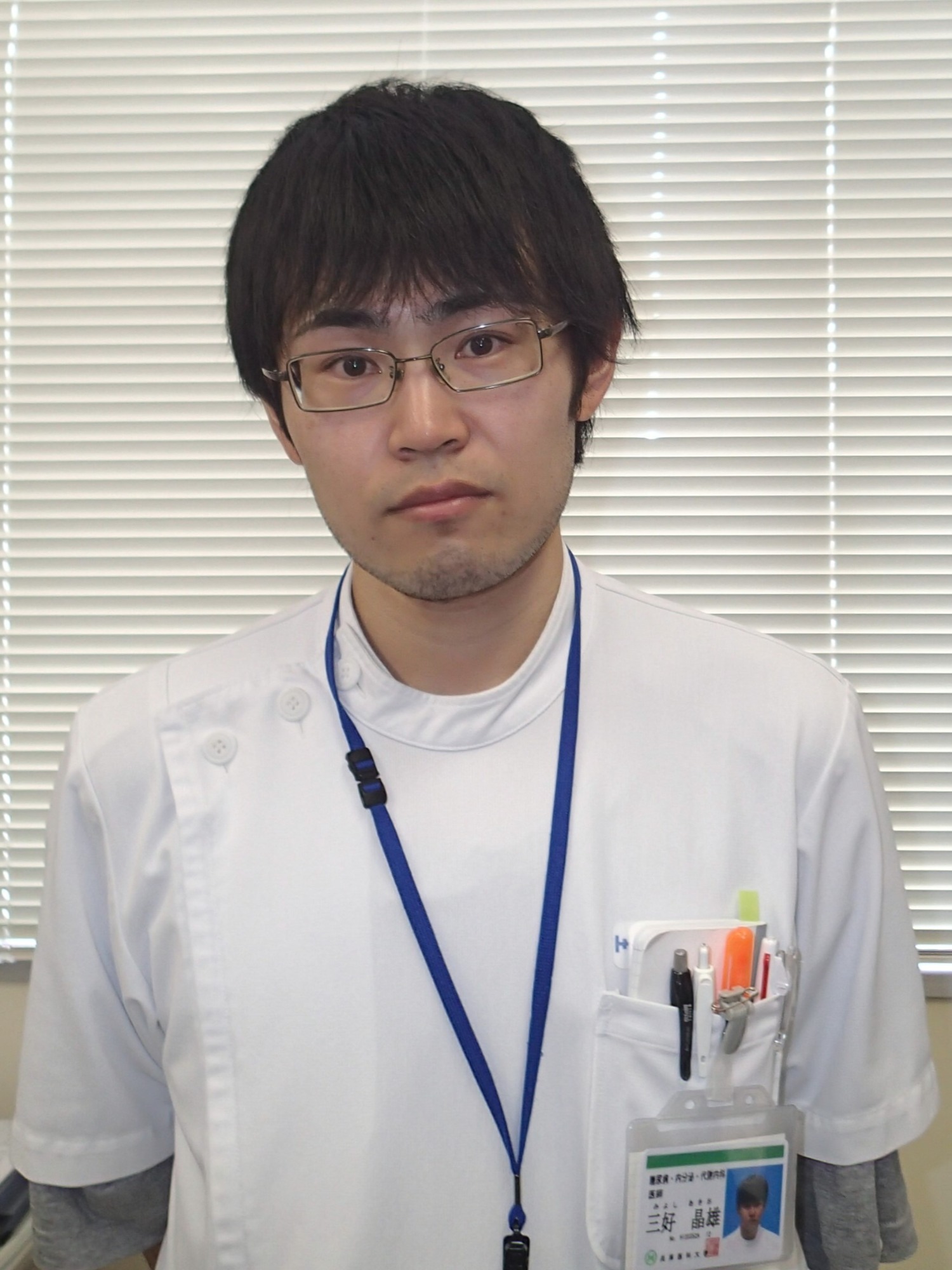Achievements
Clarification that cognitive dysfunction associated with latent inflammation is mediated by the innate immune receptor "RAGE"
Hyogo Medical University (Location: Nishinomiya City, Hyogo Prefecture; President: Keiichiro Suzuki) School of Medicine Department of Diabetes Endocrinology and Clinical Immunology A research group led by Senior Professor Hidenori Koyama, Graduate Student Graduate School of Medicine Omori Kano, Assistant Professor School of Medicine Department of Diabetes Endocrinology and Clinical Immunology Akio Miyoshi, Graduate Student Department of Immunology (Lecturer Yoshifumi Yasuda, Senior Professor Etsushi Kuroda), Department of Pharmacology (Senior Professor Shiho Kitaoka), Kanazawa University (Professor Yasuhiko Yamamoto) and others, in collaboration with the graduate school and , have revealed that "latent inflammation (Prof. Shiho Kitaoka) and Kanazawa University (Prof. Yasuhiko Yamamoto), we have elucidated that cognitive dysfunction associated with "latent inflammation" is caused by the receptor "RAGE".
The results of this research were published in the online edition of the scientific journal Brain, Behavior, and Immunity (Impact Factor 15.1) published by Elsevier on December 22, 2023. Brain, Behavior, and Immunity Volume 116, February 2024, Pages 329-348
This study began in FY 2018. Hyogo Innovation Challenge (HIC) Project This is a part of the "Stress in the Brain" program, which has been promoting cross-disciplinary basic and clinical research on how stress in the brain manifests itself and what effects it has on the human body.
For more information on the study, see
Topic
RAGE in circulating immune cells is fundamental for hippocampal inflammation and cognitive decline in a mouse model of latent chronic inflammation
Author of the paper
Dasen Ye, Akio Miyoshi, Tomoe Ushitani, Manabu Kadoya, Masataka Igeta, Kosuke Konishi, Takuhito Shoji, Kobun Yasuda, Shiho Kitaoka, Hideshi Yagi, Etsushi Kuroda, Yasuhiko Yamamoto, Jidong Cheng, Hidenori Koyama
Research Summary
In this study, using mouse models created using genetically modified mice, bone marrow transplants, and adenovirus-based gene expression systems, Koyama and his HIC research group have revealed that cognitive dysfunction due to conditions such as metabolic syndrome accompanied by "latent inflammation" is caused by the latent activation of peripheral immune cells via the receptor "RAGE" involved in natural immunity, proving for the first time the possibility of preventive and therapeutic methods targeting RAGE.
Research Background
Latent inflammation has been attracting attention for its involvement in metabolic syndrome, obesity, diabetes, etc. These diseases are recognized as risk factors for the onset of dementia, but it was completely unknown whether "latent inflammation" is involved in cognitive decline, and if so, the mechanism and target factors for prevention and treatment.
Research Methods and Results
Koyama's HIC research group has previously shown that a receptor involved in natural immunity called "RAGE" is deeply involved in the progression of obesity and arteriosclerosis. In this study, graduate student Kanae Omori and assistant professor Miyoshi Akio proposed and verified the hypothesis that "latent inflammation may be involved in cognitive decline." As a "latent inflammation model," a mouse model was used in which minute amounts of lipopolysaccharide (LPS), a bacterial toxin, were administered continuously for four weeks. In addition, the involvement of RAGE was analyzed using RAGE-deficient mice, either genetically modified mice or peripheral immune-specific RAGE-deficient mice obtained by bone marrow transplantation.
The "latent inflammation model" did not induce an increase in cytokines such as IL-1β in the blood, but showed characteristics similar to metabolic syndrome, such as weight gain, elevated blood sugar, and increased visceral fat, and also impaired cognitive functions such as spatial memory.
On the other hand, in the "latent inflammation model" of RAGE-deficient mice, no cognitive impairment occurred.
In addition, we clarified that cognitive impairment in the "latent inflammation model" is induced via the RAGE-dependent induction of adhesion factor PSGL-1 in peripheral blood mononuclear cells, inflammation of vascular endothelial cells in the parahippocampal gyrus, proliferation and activation of peripheral blood-derived microglia, and increased IL-1β production in brain tissue.
More interestingly, when RAGE decoy receptors were overproduced in peripheral blood using adenovirus, inflammation in the parahippocampal gyrus and cognitive impairment due to latent inflammation were almost completely suppressed, suggesting that peripheral immune cells may be the target of cognitive impairment.
This study revealed that latent inflammation, which is deeply involved in metabolic syndrome and other conditions, causes brain inflammation and associated cognitive impairment through the latent activation of peripheral immune cells via RAGE, and also demonstrated the possibility of preventive and therapeutic methods targeting RAGE.

Future challenges
The results of this study demonstrated that latent inflammation, which is deeply related to metabolic syndrome, obesity, diabetes, etc., causes brain inflammation and cognitive dysfunction, and clarified the significance of RAGE as a major target. Questions raised by this study include, "Does a similar mechanism apply to metabolic syndrome models induced by high-fat diets, etc.?" and "What is the cause of latent inflammation in metabolic syndrome and other conditions in the first place?" Research into these questions is already underway, and we are also focusing on translational research into clinical research based on the findings of this study.
Source of research funds etc.
Hyogo Innovative Challenge Project (to HK), Grant-in-Aid for Scientific Research (JP20K18914, to AM; JP18K08531, to HK), Hyogo Medical University University of Medical Science Graduate Student Research Grant (to DY), Hyogo Medical University Research Grant (to AM),


